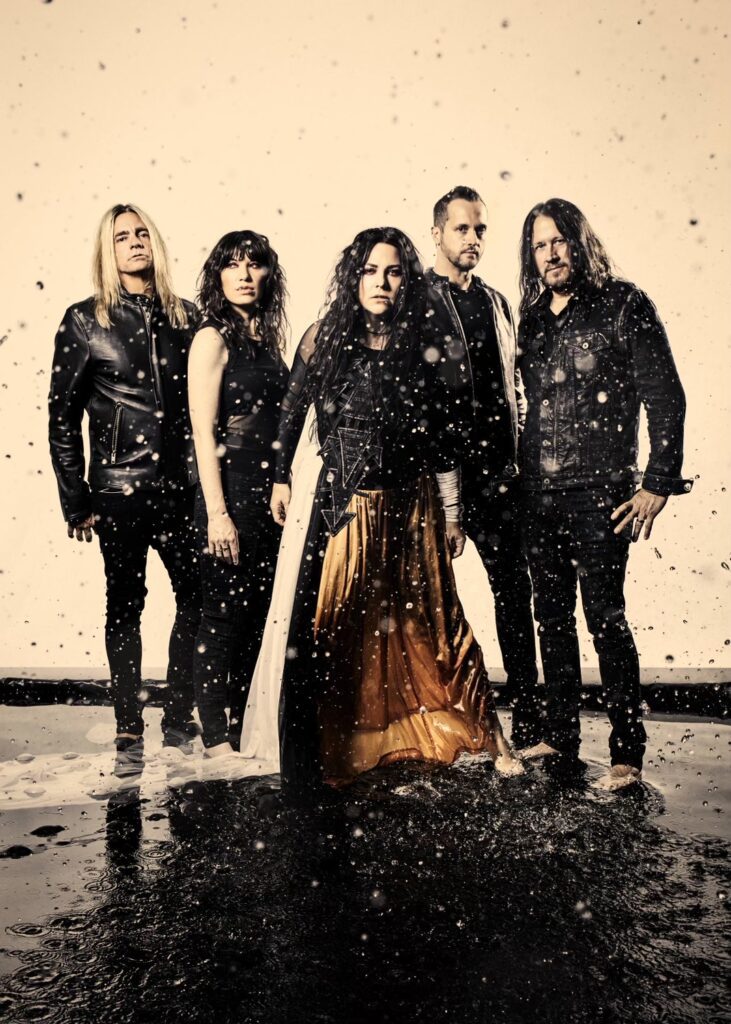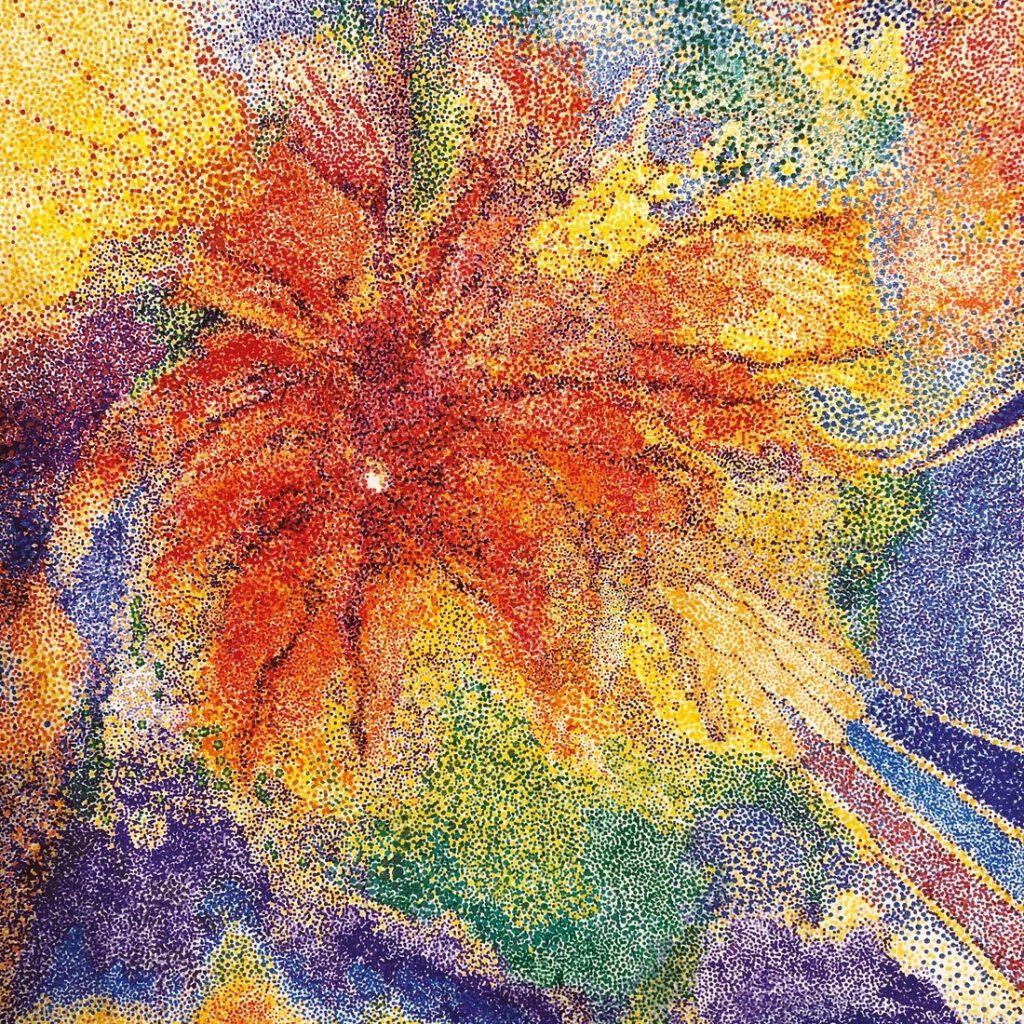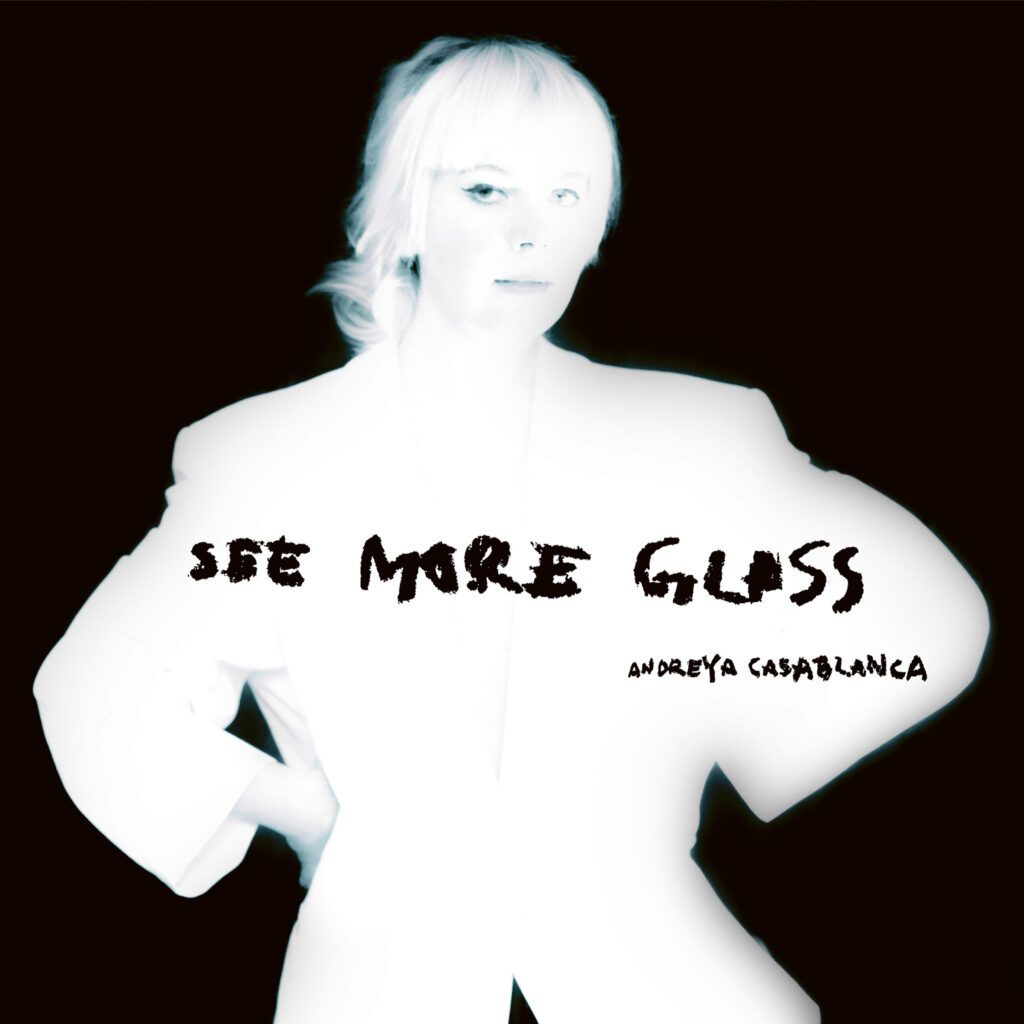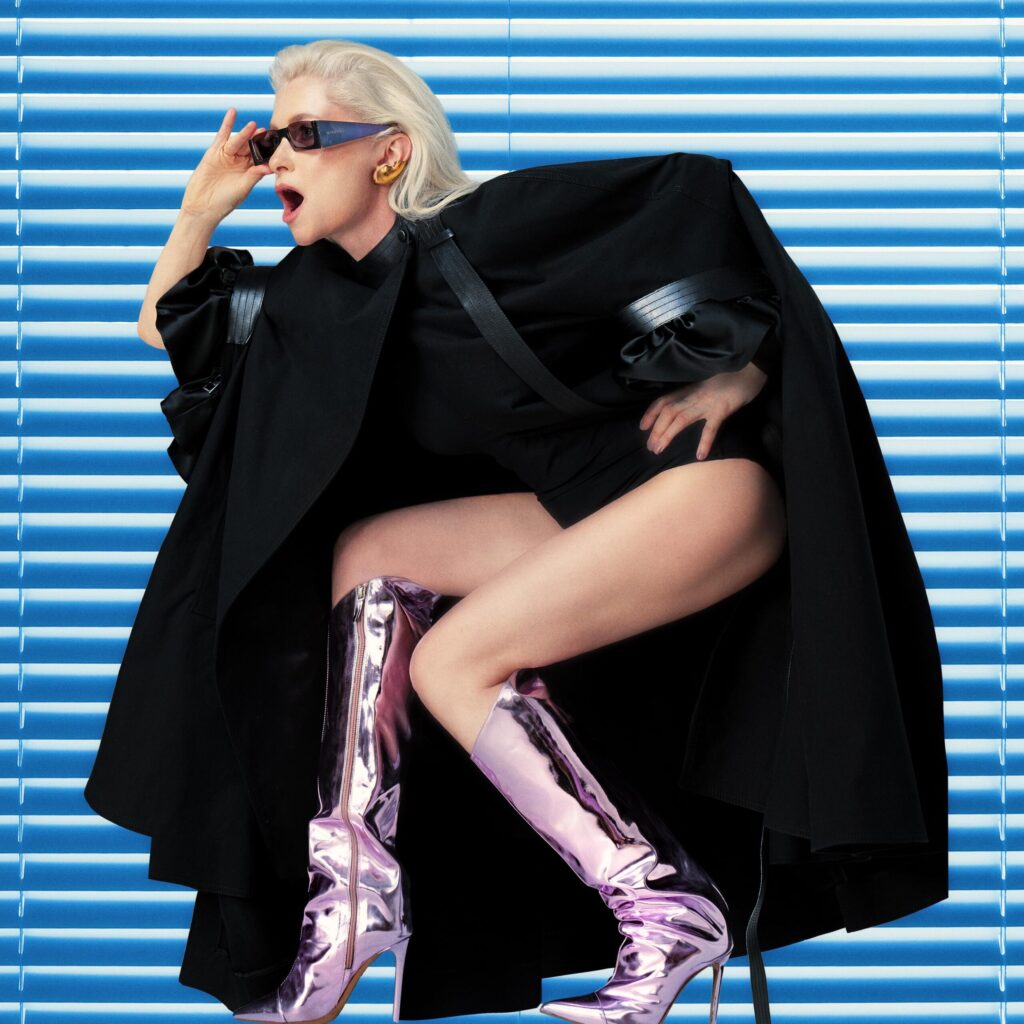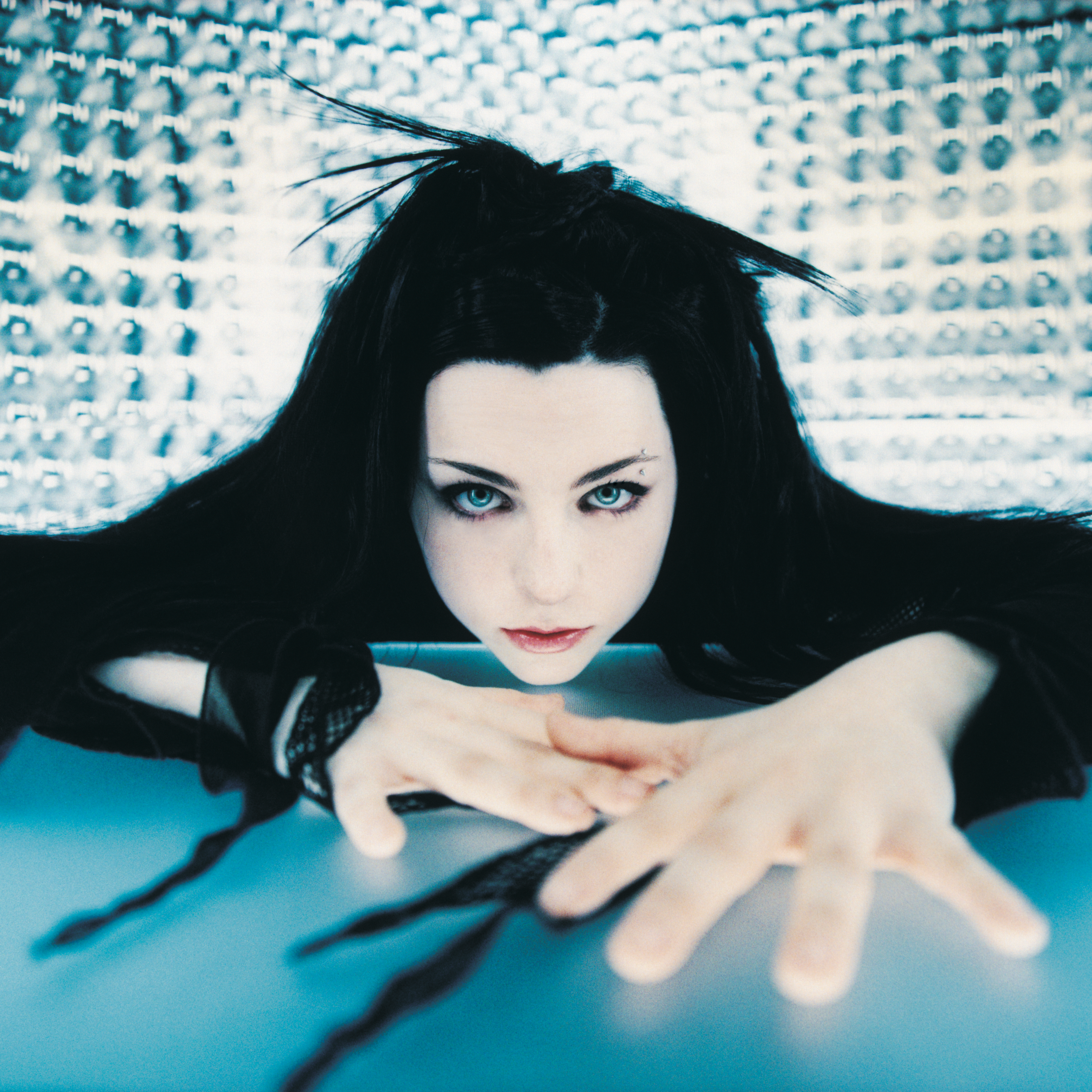
We’ve Got A File On You features interviews in which artists share the stories behind the extracurricular activities that dot their careers: acting gigs, guest appearances, random internet ephemera, etc.
By almost any metric, Evanescence’s Fallen is one of the biggest albums of the 21st century. Its emotive hybrid of gothic rock and nü metal has moved 17 million units worldwide; only Adele, Norah Jones, Eminem, and Lady Gaga have released albums since 2000 that have sold more. Evanescence were nominated for five awards at the 46th Grammys, winning two, for Best Hard Rock Performance and Best New Artist. Fallen’s inescapable lead single, “Bring Me To Life,” peaked at #3 on the Billboard Hot 100 but topped the charts in the UK, Australia, Italy, and Belgium. If you consider Fallen a metal record, it’s easily the most popular metal record of the past 25 years. (It’s certainly the most popular album ever to include a cover of the Christian death metal band Soul Embraced.) Evanescence remain stalwarts of the hard rock circuit, playing arenas and amphitheaters alongside contemporaries like Korn and Halestorm. Their electronics-tinged 2021 album The Bitter Truth charted well, and it’s already established itself as a fan favorite. But for a rarified stretch in the early-to-mid-2000s, they were one of the biggest bands on the planet.
Fallen’s dominance didn’t come without birthing pains. Founder and frontwoman Amy Lee had to fight tooth and nail to remain the only singer in Evanescence. These were the heady, exuberant days of A&R meddling, and the label wanted Lee to make room for a full-time male co-vocalist — a Mike Shinoda to her Chester Bennington. She stood her ground, arguing that another singer would fundamentally alter the sound that she and guitarist Ben Moody had built over nearly a decade of home-recorded demos in their native Little Rock, Arkansas. The two sides eventually reached a compromise. 12 Stones vocalist Paul McCoy would contribute a guest rap part to “Bring Me To Life,” but Lee and Evanescence would retain control over the rest of the album. In February 2003, “Bring Me To Life” and the tender piano ballad “My Immortal” appeared on the soundtrack for Daredevil – a critical punching bag that nevertheless tripled its money at the box office – and Evanescence were on their way to superstardom, before Fallen even dropped.
In honor of Fallen’s 20th anniversary, Evanescence have compiled a deluxe, remastered edition of the album. The bonus material is an enjoyable grab bag of alternate takes and live versions, but one track stands out. It’s a demo for “Bring Me To Life,” with a ripping guitar solo in place of McCoy’s rap verse. Making one of the most familiar rock songs of this century sound new again is no easy feat, but that demo version pulls it off.
Bonus tracks notwithstanding, Lee sounds satisfied with Fallen, compromises and all. “I had the spirit of really protecting the original,” she says of undertaking the reissue project. “I didn’t want to make some big departure. I wanted to honor what was then, because I think so much about us now is pushing it further, and doing the next thing, and surprising people. I didn’t want to go back and change it all. I wanted to say, ‘This is a preserved moment in time.’”
Lee talked to us about Fallen, appearing on MTV Unplugged with Korn and the Cure, making a children’s album, lending her voice to the new Metalocalypse movie, and more.
Fallen (2003)
I’m curious about the “Bring Me To Life” demo on this new anniversary edition of Fallen. Is this the exact version that you played for the label before they pushed for the rap part?
AMY LEE: Actually, no.
What’s the timeline on it? Where does it come from?
LEE: We did, like, at least nine demos of “Bring Me To Life.” Because they had decided this was the song that’s gonna be the first single, and we’re gonna put a whole bunch of focus on this breaking-in point. So, they just kept being like, “How about do the whole thing again, but add this?” And they were paying us. It was back in the day when people got artist development, which was actually really cool. So we kind of had to do what they said. [laughs] “OK! Whatever it takes!” We just did that demo a million times, and that one, as far as I can tell, is the last one or one of the last ones before the rap happened. They were already giving us notes at that point, but it didn’t go there. The Daredevil thing hadn’t come up, and we hadn’t had that whole new wave of, “OK, now let’s talk about this whole new idea.” So I felt like that was a good representation of us getting it all the way to another version that you’re not already pretty much hearing on the album.
You’ve been open about your fight with the label about adding a male co-vocalist, and how the guest spot that ended up on that song was the compromise. Is this version that we’re hearing now, this demo, kind of how you still think of the song in your head?
LEE: You know, actually, after all this time, playing the song a million times live, they’re never done growing. Especially when it’s a song like that. We’re always gonna play “Bring Me To Life” at a show. We want it to get better and better. We want it to be interesting. And also, you realize you have moments when the crowd does something. Make space for that. Let’s make extra space. We have a whole new part of it that’s a little bit longer, where we get everybody with their hands in the air. So when I think of the song, actually, I hear it the live way, because that’s the way I’ve heard it the most in my life. And the rap is in there, just, I do the rap, which is pretty fun. It’s not really a rap. It’s such a weird way to call it. Anyway.
A ton of people feel a very strong connection to Fallen. It’s also a snapshot of who you were at 21. Is that kind of strange, to have people feel so intimately connected to this very young version of you?
LEE: Yeah. You know, that was hard for a minute, because it was always really a stress of mine in the beginning to bring them along to the next thing. Because I love making music, and my personal quest as an artist is always about sharing more and more and more, and showing the whole picture of my heart and things that I’ve experienced, and drawing from real life. And there’s just so many colors to a human being, and to the things we experience. It would be impossible at any age to sum up your whole self in one song, or even in one album.
So that was actually my biggest reservation about the idea of having a guest vocalist on the first song, was that if this is our only chance – because that happens all the time, this is the thing that people are gonna hear and it’s all they ever hear of us, which is totally possible – I want our first thing to be the best possible representation. That’s why there’s so much pressure on a first entrance single. It’s like, I have to show you who I am as completely as possible, for a million reasons. One of them being, if you like it, you get the rest of the album and you’re not disappointed. Or if you hate it, it’s like, “Wait, that’s not fair! That’s not it! Please listen, I have more to say!” A lot of that fear was quelled very quickly, because “Going Under” did great, and of course “My Immortal” did great, and we have brought so many fans along. At this point, 20 years later, it’s insane. I am so grateful.
So yeah, that bothered me at first, and I’ve gone through a couple of little moments like that. But I don’t feel like that anymore. We have millions of amazing fans who love our latest album. And I feel really proud of everything that’s out there. And in context, I love Fallen. It’s not that I love it less…actually, I do! I love it less out of context. In context of the whole picture of us, and all of our growth, after all this time, I love it. But if that was our only thing that we had done, it would really bug me. So maybe that’s the reason I can’t stop coming back.
The Early Days Of Evanescence (1994-2000)
You started the band as a teenager. What was the music scene in Arkansas like in the mid-’90s? Did people know what to make of you guys?
LEE: It was different. We were different, even for that. I always saw that as a positive. The time period is part of that. [We were] super influenced by grunge and alternative. Heavier stuff, too. But what was the music scene like in Arkansas? It was what you would expect. Country was big. Hip-hop, pop, whatever was on the radio. Whatever you’re being fed by the top 40. So there’s that world, and then there was this total counterculture death metal scene. So, we obviously didn’t fit into either of those groups. But the death metal scene was a little bit closer. Those were the concerts I went to, in tiny, sweaty, back-of-the-pizza-restaurant clubs and stuff. I definitely learned to have an appreciation for this really heavy, rhythm-driven music, and cool riffs, and double bass pedals.
That’s not where I came from. That’s not my origins in music. I was really into classical. Dramatic classical, and then Soundgarden and Björk and cool, interesting alternative music. So when we did our thing, what was different about us was, first, that we weren’t a live band. It was just me and Ben [Moody]. Kids making music, in my parents’ garage and his parents’ garage and basement. Any basement or garage, or studio we could borrow after hours at my dad’s radio station, or anything like that. And we were recording artists. We were just finding what we could and making sounds. It was more like an electronic duo, and then pulling in band elements was always like, “Who will do a show with us?” And we’d gather up a drummer, and a bass player, and another guitar player, and promise them pizza and play a show. And we got signed [by the BMG-distributed Wind-Up Records] pretty quickly. We’d only played a few shows. It was like, “OK, we’ve got to put a band together, and make this real.” So we really grew up and became a band in front of the world.
It’s a very old-school, major label A&R story, I feel like. You get discovered, you get plucked, and you get brought out to LA. That kind of thing doesn’t really happen anymore in the way it did then. What was that moment like for the band, to kind of be thrown from playing the pizza place, to now, you’re in show business?
LEE: It was tumultuous. It was fighting. It was so much push and pull. It was gratitude, as well, but I felt from a pretty early point that I was constantly having to fight everyone around me to not sell out all of our vision.
So, we got signed, and it was awesome because we didn’t have to do a showcase. Everyone else wanted us to play a live show, and it was like, we’re not really like that. We still have to put this together. And this one label from New York was obsessed with it, and they’d had big success before, and we were like, “OK, we’re doing this.” Just a really rash decision at 19. And then instead of it being like what it sounds like when you say it, which is they flew us to LA, they put us in a cool place, and it’s cool and we’re making this album now. That is what we expected. We thought the album was done. But I have to be grateful now, because what we thought the album was is nowhere near as good as what Fallen ended up being, because they made us do crap that we didn’t want to do and write more music.
We had the freedom of not having to have jobs that would suck all of our energy. We could make our job impressing the label with something great. So, we just worked on writing new songs and demoing songs for a year and a half. And there were rocky moments in there, where we had to fight for our rights, and go home, and there were insults flying around everywhere when we didn’t do everything that they wanted. But all those fights were completely worth it, too. It was just the right combination of saying we’re gonna write more and do more, and also fighting back on the things that would’ve absolutely bastardized this whole thing and made us something that wouldn’t have existed this long.
Joining Korn For “Freak On A Leash” On MTV Unplugged (2006)
How well did you know Korn before they asked you to do that?
LEE: Oh, quite well. I loved Korn. Korn was one of the heavy bands that I loved, and I was so excited as a fan when they wanted to do something with me. We toured, I think, right after that. I think that was one of the last MTV Unpluggeds they did.
I think you’re right. I miss it!
LEE: I do too! It was beautiful. I made up my part the day before, I came in, we ran through it one time, and that’s it. I loved doing it, and then we went on tour together after that, which was cool. And then we did it again 15 years later.
Yeah, you stayed close.
LEE: Yeah. And then we finally did that song live! Because we never did it back in 2007 or whatever, when we first toured together. And this time, I was like, “Are you gonna have me up on that song, or what? Come on!”
The Cure were also a part of that show. Did you get to hang out with Robert Smith?
LEE: Yeah, we were all on the couch together, hanging out backstage. It was pretty amazing.
Singing “Sally’s Song” For Nightmare Revisited (2008)
I saw the Nightmare live show in LA a couple of years ago, and Billie Eilish sang that part.
LEE: Oh, amazing!
It’s cool how that song is kind of becoming a standard for alt-leaning pop singers.
LEE: Yeah! It’s funny you say the word “standard,” because there’s so few [new] Christmas standards. These songs that we’re always going to listen to, they’re all from the exact same era. And I do it too. But The Nightmare Before Christmas is one of those really rare things, where there are holiday songs on that – countercultural, of course – that are gonna live forever.
Yeah, and that belong to a younger generation. Was Nightmare big for you growing up?
LEE: Yes. It came out when I was 11 or 12, which was perfect. I mean, it was perfect. I think Edward Scissorhands was right before that, and I was obsessed with that. That’s one of my favorite scores. And then [Nightmare] came out, and I was really blown away, because I have a big love for stop-motion animation. My first record that I ever bought with my own money was the California Raisins. [laughs]
Wow!
LEE: I have always really loved what we used to call Claymation, but stop-motion animation stuff. And seeing my favorite director [Tim Burton] and my favorite score composer [Danny Elfman] do something that was that, I was a fan for life. Immediately obsessed with it.
How did you end up getting to do “Sally’s Song” for that record? Did you know Danny at that point?
LEE: No, but he was really nice to me. He invited me over to his house. It was a really surreal, cool experience. But [Disney] just asked me. I also did a random song that I don’t know a lot of people know from The Muppets [“Halfway Down The Stairs”] on their Muppets tribute album, but I think that was after that, because they were like, “Hey, that went well, let’s do another one.” But they asked me. I got the call, and I said, “Hell yeah! Please, can I do ‘Sally’s Song?’”
Nightmare – thanks in large part to Hot Topic, I think – is synonymous with a certain strain of alternative fashion. And for a while there, I think Evanescence was as well. I was in high school in the mid 2000s and there was definitely a lot of “the Amy Lee look” in the hallways. Did you ever see yourself as a style icon? Was that something you cared about?
LEE: I really have always been into fashion design. As a kid, it was hard for me to choose a definite career path, because I loved music. I felt like music was my passion, and I had to do music. But I also had a lot of passion about visual art and fashion design. And I have journals full of all of it. And making things, I’ve always made most of the art in our homes. I buy art, too, but I get an idea, and I’m like, “I want that on my wall. Here’s what needs to be here.”
I am so lucky, because what I’ve been able to do is combine all of those things into this job. I get to make my music, which is the center and the focus and the king. That’s the point, but then all around that, from production design ideas to album art ideas. I usually sketch them out before we do an album cover. I have a sketch of every one, where I had an idea, and I was like, “This is what we need to make. This is the title, this is the vibe, these are the colors.” And then with clothes, too, I’ve been making my stage wardrobe forever. Not all by myself, but I design it and I have somebody with a lot more patience than me do the math and help me take it all the way.
Her Children’s Album, Dream Too Much (2016)
Dream Too Much came out in 2016. Your son was born in 2014. I imagine there’s a correlation there.
LEE: Mm-hm, definitely! Making music isn’t always serious. You just sing your way through the day sometimes, and I realized that extra after having a baby, because you just end up filling the space with happy sounds. My husband and I both do it. You’re just singing through the activity, and then it’s like, “That’s kind of funny.” The song “Dream Too Much,” I was goofing around on the guitar, and Jack as, like, a two-year-old was saying those first couple of lines while he was playing. “There’s a monkey in the band!“ He was talking about Curious George, I think. And then, “The muffins are sleeping!“ I was like, “The muffins are sleeping? Awesome, we’re putting that in there.” [laughs]
It was fun to just have an opportunity to let things be goofy and fun, and when you have that subject there, you know exactly how to entertain them. There’s a person to focus on. It’s like, “I’m going to make this the thing that you love.” Including the stop-motion animation, and the instruments that are click-y. He used to love this Nesquik commercial with a STOMP vibe. Everything was pencils on glasses and chicka-chicka-choo-kah stuff. My producer and co-writer friend, Will Hunt – not Will Hunt the drummer [of Evanescence], very confusing – we did that album together, and he’s this super, like, science-y, fun, experimental music guy. We became friends over our love of Björk. He’s like, “Oh, this is great. I have all these weird tubular sticks and junk we can make sounds out of.” And it was just this really fun experience where I got to work with my whole family.
It sounds so naturalistic, or something. It doesn’t sound like the discipline of songwriting. You almost make it sound like you were just goofing around.
LEE: We were having so much fun! That’s what it always should be. I think that’s where good music comes from, is that you’re enjoying what you’re doing and that translates. But there are different paths and ways. It felt like we didn’t have to think so hard and make it complicated for an adult audience. It’s funny, because you make choices that are just natural, and you realize that maybe that’s not such a bad idea in general. There was definitely learning through that experience.
Metalocalypse: Army Of The Doomstar (2023)
I recognized your voice right away, even though you have like two lines.
LEE: I keep meaning to capture the clip and put it on social media somewhere! I want them to hear my voice screaming.
I was looking at your IMDb, and I was somewhat surprised that you haven’t done much voice acting or acting. Was that ever something you were interested in pursuing?
LEE: Always. I’m always asking for the right opportunities to do that stuff. I haven’t always had the best representation, and I think that maybe held me back in the past, when I would have really liked it. I just didn’t have the access that you’d think that I would. But I’m not in that situation now, so I’m always looking for something fun like that, whether it’s voice acting or making music of any kind for a film. It’s interesting the way the film industry and TV industry work. It’s so depressing how often things go so far and then get canned. There are so many things that get half-made and then dumped, and I’ve written music for a lot of those. [laughs] It’s not my fault! Or maybe it is. Maybe I should stay away.
Well, it’s odd, because movies have been woven into the Evanescence story. You mentioned the Daredevil thing, which ended up being so huge for you guys. Did you feel like you were interacting with Hollywood at that time, or did that feel like it was in a separate sphere?
LEE: There were moments. Hollywood doesn’t feel that separate from the music industry in LA. It’s all one big thing to me, in my mind. So going to those awards shows – or, we played the screening party for Daredevil, and all the actors and everybody were there – I definitely felt like we were intermingled in that world in a way that was very surreal. It’s weird. It’s like, “Whoa. Why are we here?”
That’s a great era, the early 2000s, for action movies randomly having a metal song over the end credits.
LEE: Right? [laughs] You’re welcome.
“Goofy Sings Evanescence’s Bring Me To Life” (2014)
I couldn’t live with myself if I didn’t ask you about the Goofy version of “Bring Me To Life.” I’m told that you’ve heard it.
LEE: I’ve heard it. I’ve heard a lot of things over the years.
When you heard it, what was your reaction to it?
LEE: Not to insult the artist…
Bring it.
LEE: Honestly, I was like “What the fuck is this? This is stupid.” It’s funny. I don’t have a huge response. So many people sent me that. Even more people sent me this recent, the music note thing. There’s this toy that’s a music note, and it’s floating and singing the song. It’s not singing, it’s like [imitates warbling noise]. It’s so bad. My favorite one of those, I will tell you because it haunts me to this day. Somebody worked at Chuck E. Cheese or Showbiz Pizza, and you know the animatronic characters of the band?
Yeah.
LEE: So, after hours, when nobody was there, I don’t know if they work this way or if this person programmed the show. I don’t know if they’re sensitive to sound, so they move their mouths and move around, or if the person programmed it, but they made a light show, and it was dark, and they’re playing the instruments, and they did like three of our songs. In the right state of mind, that’ll give you nightmares. It was horrifying and awesome. And I salute you, sir or ma’am, whoever you are. [laughs]
You’ve got music that’s kind of been absorbed into the broader pop cultural consciousness, and I guess that’s why these things happen. There’s also the Ariana Grande thing on Fallon, where she’s doing a vocal impression of you. Is that kind of stuff surreal? How do you even process that?
LEE: It’s not surreal anymore. When we were starting out, it was. But at this point, living with it for this long, the music kind of just takes on its own life, and you start to see it as separate from yourself. It’s hard to explain. It started out very surreal and strange, and impostor syndrome is very real, but I feel like at this point, I’m where I’m meant to be. It’s amazing and I’m proud. I am ready to accept my fate as goth superstar Amy Lee of the fuckin’ dark-ass band Evanescence.

